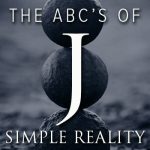 As for the person who hears my words but does not
As for the person who hears my words but does not
keep them, I do not judge him. For I did not come to
judge the world but to save it.
— John 12: 47
In the article The Algebra of Simple Reality in this encyclopedia, we find Brugh Joy’s formula for happiness: A+B+C=H and it expressly includes “judgement” as a self-destructive behavior, a barrier to happiness.
A Don’t judge
B Don’t compare
C Release the need to know why
H Happiness
What is so wrong with being a tad judgmental? “Whenever we categorize things as good or bad, we essentially reject ourselves because the very activity of the mind in making the classification blocks off direct experience. Moreover, when we judge something as good, whether it is an internal feeling or an external event, we affirm its dualistic nature and set ourselves up for the complementary ‘bad’ experience.”[i] John Ruskan seems to have answered that in a convincing and insightful way.
Judgement, it seems then, cannot co-exist with awareness. David Hawkins continues the indictment of judgement. “Judgmentalism. This is the great vanity of all egos. Scripture says, ‘Judge not, lest ye be judged.’ Also, ‘Judgement is mine, sayeth the Lord.’ Christ said to forgive. The Buddha said there is nothing to judge because perception can only see illusion. Perception is always partial and limited by an arbitrary context. In truth, no judgment is possible.”[ii]
Seth now takes the stand to testify both for and against judgment because of the necessity of free will. “Man is innately good. His conscious mind must be free, with its own will. He can, therefore, consider himself bad. He is the one who sets those standards in his own image.”[iii]
And finally, to provide the concluding evidence, we turn to A Course in Miracles for these insights on judgment:
“The world trains for reliance on one’s judgment as the criterion for maturity and strength. Our curriculum trains for the relinquishment of judgment as the necessary condition of salvation.”[iv]
“Judgment implies a lack of trust. Harm is the outcome of judgment.”[v]
“Judge not, for you but judge yourself.”[vi]
The insight about judgment that we are aiming for is that it is part of the illusion of P-B. “It is necessary … to realize, not that he should not judge, but that he cannot. In giving up judgment, he is merely giving up what he did not have. He gives up an illusion; or better, he has an illusion of giving up. He has actually merely become more honest. Recognizing that judgment was always impossible for him, he no longer attempts it. This is no sacrifice. On the contrary, he puts himself in a position where judgment through him rather than by him can occur. And this judgment is neither ‘good’ nor ‘bad.’ It is the only judgment there is, and it is only one: ‘God’s Son is guiltless, and sin does not exist.’”[vii]
“Wisdom is not judgment; it is the relinquishment of judgment.”[viii]
That about says it all.
[i] Ruskan, John. Emotional Clearing. New York: Broadway Books, 2000, p. 147.
[ii] Hawkins, David. The Eye of the I. Sedona, Arizona: Veritas Publishing, 2001, p. 181.
[iii] Roberts, Jane. The Nature of Personal Reality. New York: Bantam, 1974, p. 159.
[iv] A Course in Miracles © Volume Three: Manual For Teachers (Farmingdale, New York: Coleman Graphics), published in 1975, by the Foundation for Inner Peace, P.O. Box 598, Mill Valley, CA 94942-0598, www.acim.org and info@acim.org. p. 25.
[v] Ibid., p. 11.
[vi] Ibid., p. 37.
[vii] Ibid., pp. 26-27.
[viii] Ibid., p. 27.


